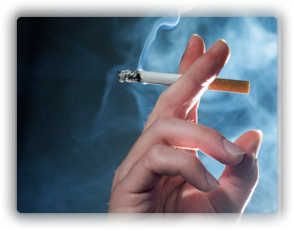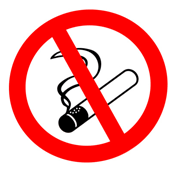Second-hand smoke
 What is second-hand smoke (SHS)? Second-hand smoke, also known as environmental tobacco smoke (ETS), is a mixture of the smoke exhaled by smokers (mainstream smoke) and the smoke given off by the burning end of tobacco products (sidestream smoke).
What is second-hand smoke (SHS)? Second-hand smoke, also known as environmental tobacco smoke (ETS), is a mixture of the smoke exhaled by smokers (mainstream smoke) and the smoke given off by the burning end of tobacco products (sidestream smoke).The harmful effect of SHS Studies show that second-hand smoke, similar to active smoking, can cause many fatal diseases such as heart diseases and cancers. Second-hand smoke contains a complex mixture of more than 7,000 chemicals, of which more than 50 are known carcinogens. The concentrations of some toxins contained in sidestream smoke (such as carbon monoxide, ammonia, benzene and hydrocarbon compounds) were found to be higher than in mainstream smoke. In 1992, second-hand smoke was classified by the US Environmental Protection Agency (EPA) as a “Group A carcinogen” and there is no risk-free level of exposure for second-hand smoke.
The acute effects of second-hand smoke on humans include eye irritation, sore throat and cough. However, in the long term, studies show that second-hand smoke can cause or is associated with the following fatal diseases:
1) Cancers – lung cancer, nasal sinus cancer and breast cancer (in pre-menopausal young women)
2) Cardiovascular diseases – a local study shows that the risk of a non-smoker dying from a stroke increases according to the number of smokers who lived or worked with that non-smoker. Second-hand smoke causes injuries to blood vessels and disrupts the normal functioning of blood clotting mechanisms.
3) Respiratory diseases – asthma, otitis media (middle ear infection), lower respiratory tract infections and symptoms of respiratory tract irritation.
4) Complications of pregnancy and foetal development – miscarriage, low birth weight and Sudden Infant Death Syndrome (SIDS)

Tips to prevent secondhand smoke:
- Persuade your family members not to smoke at home
- Avoid standing near building entrances where people gather outside to smoke
- Choose to stand in the smoke-free section at outdoor concerts or events
- Encourage your family members and friends to stop smoking
